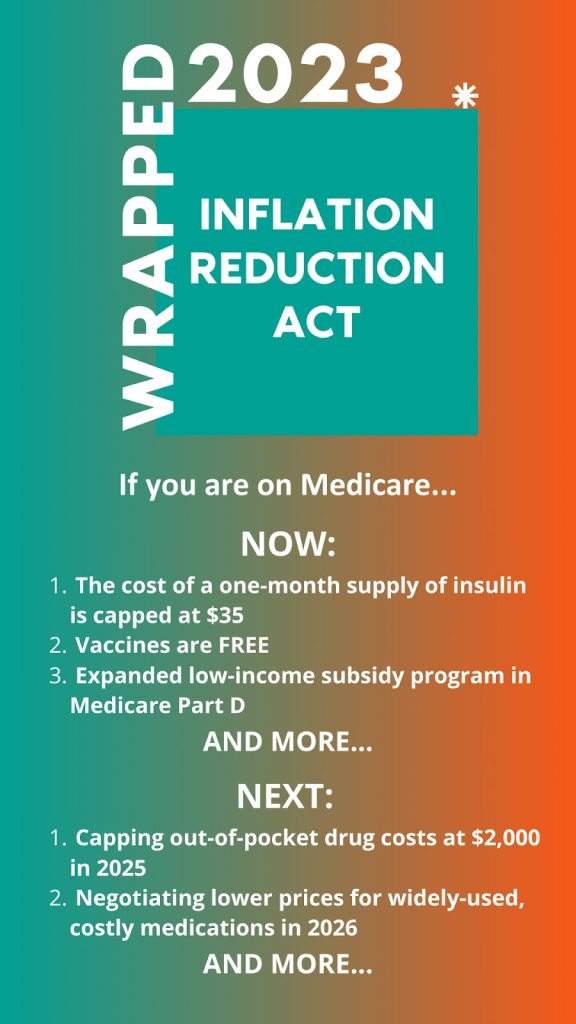
As we approach the end of 2023, we wanted to highlight the historic drug price reforms in the Inflation Reduction Act delivering relief to millions of patients on Medicare.
Welcome to the Week in Review.
1.The Inflation Reduction Act Delivers Long-Sought Relief
- Medicare negotiation is critical for patients who have been forced to pay exorbitant prices for some of the most widely-used, expensive medications. Bristol Myers Squibb (BMS) blood thinner Eliquis, one of the drugs selected for the first round of Medicare negotiations, has been priced out of reach for many patients since hitting the market in 2013. Since there are no generic competitors to Eliquis, BMS is able to dictate the price to patients and taxpayers and extract increasing amounts of profit without any meaningful improvement to the drug. During periods of market exclusivity, “drug companies use their market power to set prices well above the costs of production and distribution,” said Richard G Frank, a professor emeritus of health economics at Harvard Medical School. Christen Linke Young, White House Domestic Policy Council’s deputy assistant to the president for health and veterans affairs, called out BMS at a STAT event for fending off generic competition to Eliquis and as a result “earned themselves the privilege of getting paid $16 billion by Medicare last year alone.” This long history of unjustified price hikes has hurt patients who depend on this life-saving medication. Thankfully, a lower negotiated price for Eliquis will deliver relief to millions of patients on Medicare starting in 2026. (Philadelphia Inquirer, STAT)
2. Patent Abuse Watch
- In the latest Big Pharma shenanigans, AbbVie is suing potential competitors to its blockbuster drug Rinvoq, alleging that generic makers are infringing on more than 30 patents. This is a classic tactic in Abbvie’s patent abuse playbook, which also propelled its blockbuster drug Humira to earn billions of dollars of profit by obtaining dozens of unmerited patents and charging patients unjustifiably high prices. This latest example of patent abuse underscores the urgent need for reforms to our patent and regulatory systems. Johnson and Johnson’s (J&J) is attempting to exploit our patent system in a similar fashion by reaching settlements with generic makers to delay biosimilar versions of its psoriasis and irritable bowel drug Stelara. As a reminder, every additional day of market exclusivity for Stelara in the U.S. drives almost 18 million in revenue for J&J. Patients deserve lower priced competition to come to market and deliver relief from the unfettered pricing power held by profit-hungry brand name drug corporations. (Fierce Pharma, Biospace)
3. States Push For Lower Insulin Prices
- There’s growing momentum within state and local governments to ease the financial burden of expensive insulin medications. Lawsuits have been filed in Utah, Arizona, New York, Virginia, and Maryland alleging that big insulin makers — Eli Lilly, Sanofi, and Novo Nordisk — worked in tandem with pharmacy benefit managers (PBMs) to price insulin out of reach for many patients who depend on this life-saving medication. These profit schemes hurt patients–too many of whom have been forced to ration their insulin supply or completely go without because of its high price tag. Taxpayers are also directly affected by the enormous costs placed on the U.S. healthcare system. The $35 monthly insulin copay cap for patients is just the start — we will keep fighting until insulin is affordable and accessible to everyone! — (STAT)
BONUS: P4ADNow salutes Senators Dick Durbin and Chuck Grassley for introducing bipartisan legislation to increase price transparency in direct to consumer advertisements on prescription drugs. Thank you Senators for prioritizing patients over the interests of Big Pharma!
Have a great weekend!
